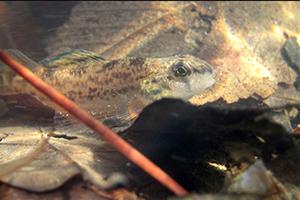Yazoo Darter
The Yazoo darter (Etheostoma raneyi) is a small fish that is found only in two watersheds – the Little Tallahatchie and Yocona River watersheds in northern Mississippi.

The Yazoo darter (Etheostoma raneyi) is a small fish that is found only in two watersheds – the Little Tallahatchie and Yocona River watersheds in northern Mississippi. In recent years, Yazoo darter populations have been on the decline, largely because of poor stream health and barriers in streams. To help reverse population declines, NRCS is working with private landowners in targeted areas to increase available habitat and improve water quality to support the species’ recovery.
Landowners in Benton, Calhoun, Lafayette, Marshall, Pontotoc Tippah, Union and Yalobusha counties of Mississippi are helping the Yazoo darter by increasing available habitat and improving water quality. Much of the work focuses on reducing runoff of nutrients and sediment from grazing lands and working forests.
NRCS offers technical and financial assistance to help landowners improve grazing lands and working forests. This assistance helps producers plan and implement a variety of conservation activities, or practices, that benefit the Yazoo darter any many other species.

Technical assistance is free to producers. The agency’s staff of experts and conservation partners work side-by-side with producers to develop a conservation plan. Each plan focuses on the improvement of streams and rivers and is tailored to the landowner’s property. These plans provide a roadmap for how to use a system of conservation practices to meet natural resource and production goals.
Financial assistance helps producers pay for the adoption of conservation systems that reduce the runoff of nutrients and sediment, such as heavy use protection areas, stream crossings and filter strips, as well as restore stream habitats.
The Yazoo darter project is part of the Working Lands for Wildlife (WLFW) partnership, a collaborative approach to conserve habitat on working lands. WLFW provides technical and financial assistance through the Environmental Quality Incentives Program, a conservation program of the Farm Bill, the largest funding source for conservation on private lands.
Habitat restored for cutthroat benefits many other species, including the Yazoo crayfish, alligator snapping turtle and rayed creekshell, all of which have been petitioned for listing as threatened or endangered by the Service.


